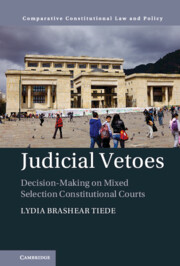Book contents
- Judicial Vetoes
- Comparative Constitutional Law and Policy
- Judicial Vetoes
- Copyright page
- Dedication
- Contents
- Figures
- Tables
- Acknowledgments
- 1 Introduction
- 2 The Implications of Mixed Judicial Selection on Decision-Making
- 3 Mixed Judicial Selection
- 4 The Chilean Constitutional Tribunal in Political Context
- 5 The Colombian Constitutional Court in Political Context
- 6 Determinants of Legal Invalidation by Constitutional Judges
- 7 Determinants of Legal Invalidation by Constitutional Courts
- 8 Weak Judicial Vetoes and Contentious Politics
- 9 Conclusion
- Appendices
- References
- Index
1 - Introduction
Published online by Cambridge University Press: 22 July 2022
- Judicial Vetoes
- Comparative Constitutional Law and Policy
- Judicial Vetoes
- Copyright page
- Dedication
- Contents
- Figures
- Tables
- Acknowledgments
- 1 Introduction
- 2 The Implications of Mixed Judicial Selection on Decision-Making
- 3 Mixed Judicial Selection
- 4 The Chilean Constitutional Tribunal in Political Context
- 5 The Colombian Constitutional Court in Political Context
- 6 Determinants of Legal Invalidation by Constitutional Judges
- 7 Determinants of Legal Invalidation by Constitutional Courts
- 8 Weak Judicial Vetoes and Contentious Politics
- 9 Conclusion
- Appendices
- References
- Index
Summary
The increased judicialization of politics over time has rendered the institutional design of courts both contentious and significant. As courts play a larger role in shaping policy, citizens and policymakers increasingly grapple with the powers of courts, selection of their judges, and their role in society in both backsliding and more established democracies. Despite claims that independent courts are important for governance and the separation of powers, politicians, past and present, often seek to control the powers of courts and judicial selection to seemingly control policy outcomes. At times, politicians successfully manipulate these two facets of courts to achieve their own ends. At other times, the composition of political actors and public sentiment as well as the strength of certain courts defies such blatant methods for controlling courts.
Information
- Type
- Chapter
- Information
- Judicial VetoesDecision-making on Mixed Selection Constitutional Courts, pp. 1 - 15Publisher: Cambridge University PressPrint publication year: 2022
